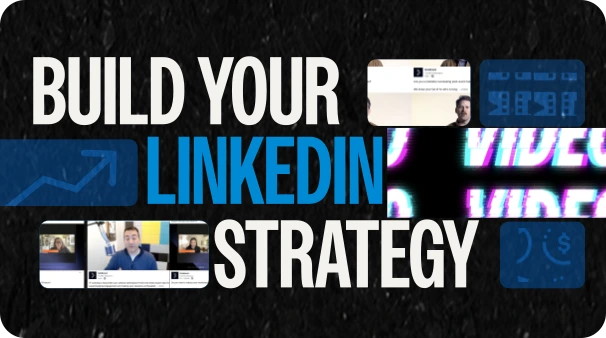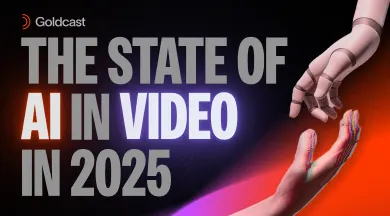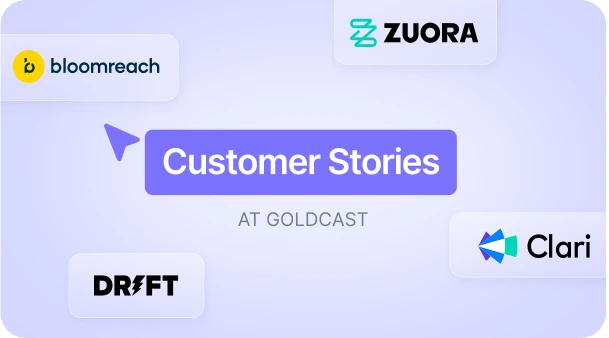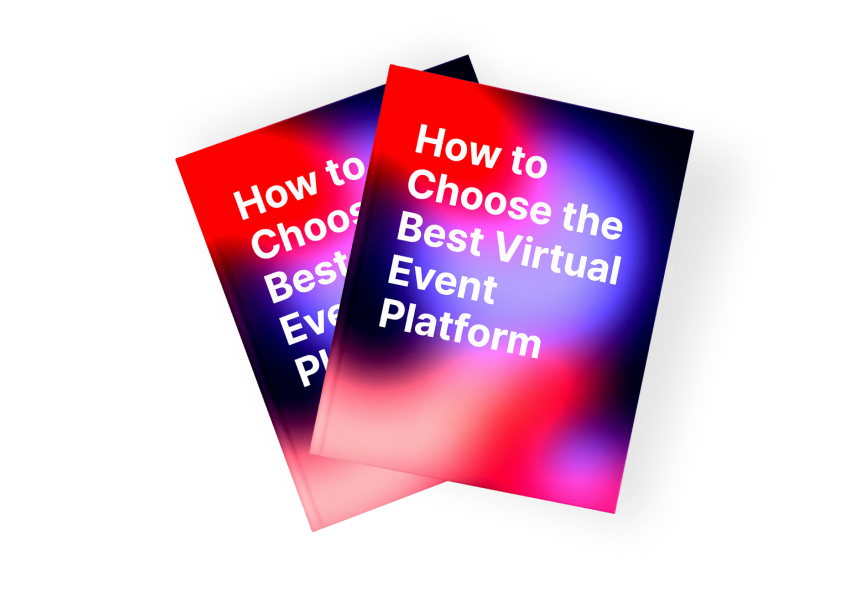How to Choose the Best Virtual Event Platform
Evaluating Budget, Features, & More
Choosing a virtual event platform for your company can seem impossible. To start, the sheer volume of vendors can be overwhelming. Just a quick look at G2 reveals there are nearly 250 options out there! How can you narrow down your search and know which one is the right choice for your company? Well, the Goldcast team is here to help! We'll help you filter through the noise, hone in on what really matters to B2B marketers, and choose the best platform for your needs. After reading this guide, you'll also know what questions you should be asking and what features to look for as you make this important purchase decision. Let’s dive in!
What is a virtual event platform?
A virtual event platform is a software application that allows event organizers to plan, host, and manage online events and virtual conferences. It provides a centralized hub for all things "event," which means your platform will handle registration, scheduling, and communicating with event attendees.
At minimum, a virtual event platform should offer:
- Live event streaming
- Event registration pages
- Event emails
- Live chat, polls, and Q&A
- On-demand access
- Performance analytics
Most of the virtual event platforms out there offer a wide array of features—we’ll dive more into the specifics below. But it’s important to consider what type of support you’ll need and where there might be overlap with other tools in your existing tech stack. As you're researching companies, you'll see many similarities between virtual event platforms and some key differences, depending on why and when the company was founded. For example, a platform that was mostly in-person but has since pivoted to a virtual platform will likely have more robust in-person event support than one that has always been virtual-first (like us!).
What’s the difference between a virtual event platform versus a video conferencing platform?
It's easy to get virtual event platforms and video conferencing platforms confused. The simplest way to explain this is by using Zoom, which we've all probably used by now for a webinar or business meeting, as an example.
Video conferencing platforms
Zoom is a video conferencing platform. These tools allow you to easily host meetings and stay connected with people all over the world. Like virtual event platforms, they also allow you to share files, photos, videos, and other content with people through the chat feature.
Virtual event platforms
The biggest difference between the two is that virtual event platforms allow you to create engaging, immersive, dynamic events that more closely replicate the in-person event experience. When you're looking to really connect with your audience and hold their attention, a standard video conferencing platform will only get you partially there.
Looking to elevate your virtual events?
Discover why Goldcast is a leader in producing highly branded and engaging B2B digital events.
How to Choose A Virtual Event Platform: 5 Important Considerations
Before we start talking about specific virtual event platforms, let's talk about the information you'll need before you can make a decision. Here are five critical considerations when it comes to choosing the right platform for your company.
1. Determine your budget
Before you do anything else, think about how much money you want to spend. Every platform is priced differently, with some charging per event registrant (which can make it tricky to predict the actual cost) and others charging a flat fee. You don't want to fall in love with a tool only to find out it's double your budget, so having this number in mind beforehand can help you weed out any definite no's from the list. And, if you end up choosing a tool that comes in less than budget, even more reason to celebrate!
2. Identify your stakeholders and influencers
Now you know your budget, which means you've probably already talked with key stakeholders. However, make sure you've mapped out everyone who might need to weigh in on this decision. Virtual event platforms can be pricey; committing to one is a big step! List out all the teams and stakeholders who will be affected by this decision or who will use the product. That might include folks from marketing, operations, finance, the executive team, and more. Once you have your list, develop a strategy for how you'll keep everyone in the loop. Perhaps you'll find a list of three platforms you like, trial them, and then present the team with your top choice. Or maybe people from different teams will also be trying some of the products at the same time you are. The logistics don't matter too much—what does matter is that you figure out what will work for you. You want to keep everyone informed while still being able to move forward with the discovery and purchasing processes.
3. Nail down your use cases
What will you use the virtual event platform for? Are you hosting internal or external events (or both)? What teams will need to use the platform for events? How many administrative users will you need? Answering these questions will help you understand which platform best meets those specific needs. For example, if you know you'll need a handful of admins, but you're investigating a platform that only allows you to have one or two, you'll know that's a dealbreaker.
4. Outline your “must have” and “nice to have” features
We'll talk about more specific features soon, but you probably already know what some of your "must haves" are.
We're talking things like:
- Integrations
- Scalability
- Customization
- Attendee engagement features
- Hybrid or in-person capabilities
One good way to keep track of everything is to create a scorecard and weigh how important different things are to you. That will help you differentiate between platforms in a way that's specific to your business and your own must-haves.
5. Estimate your audience size
As we mentioned above, every platform is priced differently, and some charge per registrant or attendee. This means that having an idea of how many people sign up for and attend your events each year can help you project your pricing should you choose to go with one that employs that pricing model. For a rough estimate, map out your tentative event plan for the year—keeping in mind the various teams that might use the platform for events. You can also tap data from previous events as a starting point to benchmark average registration and attendance rates. Here’s a quick example of what this might look like:
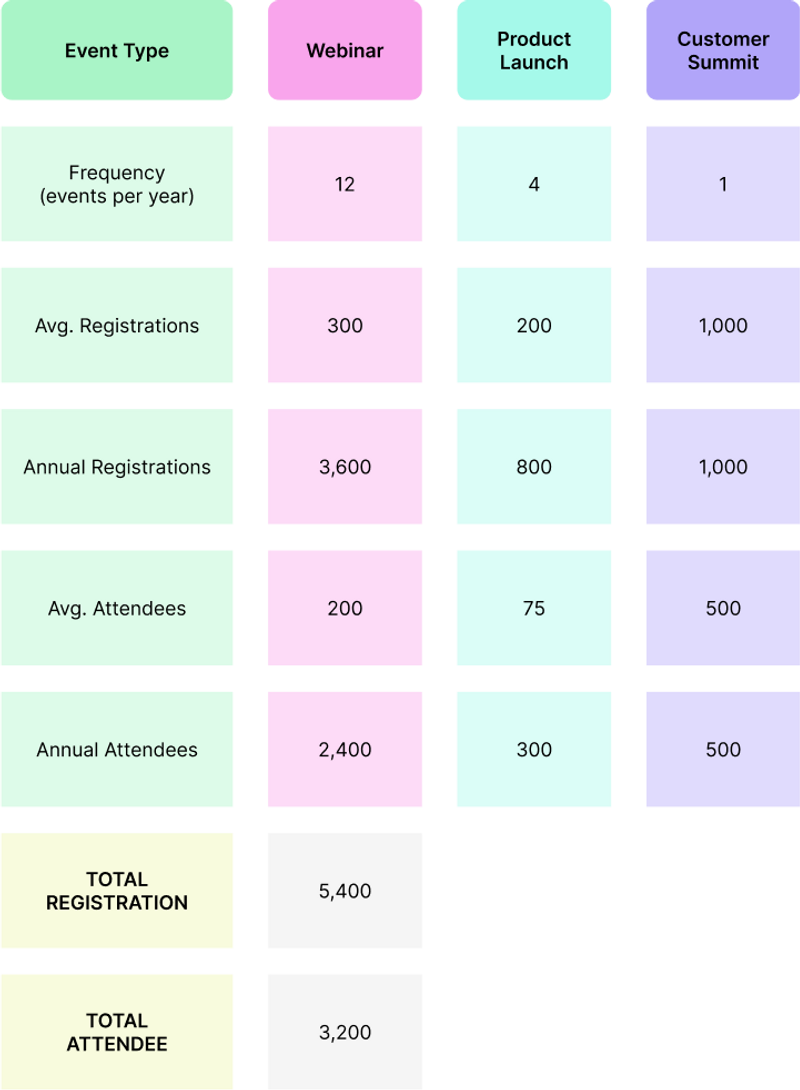
Of course, this is just a starting point. You might also want to forecast month-over-month or year-over-year growth in your event programming.
Virtual Event Platform Features For B2B Buyers To Consider
Alright! Now that you know what a virtual event platform is and have gathered the information you'll need to make your specific purchasing decision, let's get into the nitty-gritty. As B2B buyers, there are some features that you need in order to offer an elevated attendee experience. Things that other marketers might view as "nice to haves" are probably "must haves" for you. For example, take the ability to customize a platform and event materials like your event landing pages. Some companies might not value that as much, but B2B companies need to be able to present a unified, consistent brand experience throughout all events—meaning this is a feature that will probably be at the top of your list.
Here are a few important features to consider:
- Integrations (MAP, CRM, etc.)
- Video production elements
- Engagement tools
- Pre- and post-event analytics
- Ease-of-use for attendees, organizers, and speakers
- Mobile-friendly experience
- Translations, subtitles, and captions
- Hybrid event support
- Event branding flexibility
- On-demand experience
- Onboarding and support
- Pricing model
With that in mind, let's get into a quick rundown of some of the top virtual event platforms on the market!
Best Virtual Event Platforms
Below you'll find just a handful of the top vendors available today and how they stack up against Goldcast, the premiere B2B marketer's choice.
Goldcast
Let's begin with Goldcast! Platforms like Netflix and YouTube have fundamentally disrupted the way people consume content. Goldcast was created specifically to address those changes and meet the needs of B2B marketers, meaning this is a product that should rise to the challenge of all of your "must haves!" Through the Goldcast platform, companies create on-brand, customizable event experiences that drive awareness, engagement, and revenue. Anyone on your team can create, host, and manage single and multi-track events—no coding experience needed! We know that your top priority is to drive pipeline and create a lasting positive impression on your audience. Every feature of our platform is optimized for you to meet these goals, and our customers see increased attendance, engagement, and lead generation rates across the board!
Here's a glance into what some of our customers have to say about Goldcast:
Drift: All virtual summits and webinars through Goldcast
"We had incredible data post event through Goldcast that our sales teams actioned on and this resulted in 3x more pipeline than what we expected. Our BDR and Account executive teams used the granular event data for post event follow-ups and had 2x the demo conversion compared to our previous events!"
Janna Erickson, Former Director of Events, Drift
Alyce: Made events their highest pipeline generating channel
"Events are our highest pipeline creating channel and I sleep better at night knowing that our experiences are run on Goldcast-not only the platform but the team behind the platform that supports our success is next to none. The native Marketo integration saves a lot of time for us and through our marketo-salesforce sync, our sales teams are able to send sequences few hours after instead of a few days."
Nina Butler, Director of Events at Alyce
Kong: 89% of attendees rated 5/5 for event experience
"Our attendee conversion went up by 2x because of Goldcast’s automatic calendar invite functionality. The engagement metrics post event was super useful and most importantly pardot/salesforce integration automatically updates prospect’s member status in Salesforce with detailed activity."
Melanie Flores Salman Partner Marketing and Corporate Events Lead at Kong
Goldcast Pros
We reviewed popular review sites like G2 to discover what customers had to say about Goldcast, both good and bad.
Here's a rundown of the top things Goldcast customers love about the platform:
- User-friendly and easy to use from day one
- Templates that allow you to easily duplicate events, making your job easier
- Can host almost any type of event, from product launches and webinars to networking events and more
- Beautiful, immersive virtual experiences that look and feel like your brand (not ours)
- Tons of engagement tools and interactive features, from breakout sessions and gamification to live video chat and more
- Built-in registration form and page builder plus email marketing tools (no design or development experience required)
- Accessibility options, including the ability to translate into 14+ languages
- On-demand access of your recordings after the event
- In-depth, prompt engagement insights that sync straight to your CRM and MAP vendors including HubSpot, Marketo, Salesforce, and more
- Dedicated implementation and customer support, so you never have to worry about being left high and dry (this is especially important when you're in the middle of an event!)
- Generous and transparent pricing
Goldcast Cons
Some customers commented that product updates were rolled out frequently, which took some getting used to. The flip side of this is that we're constantly updating things to improve your experience! People also noted that Goldcast is a relatively new name on the market and, as such, some companies were hesitant to adopt the platform.
However, with well-known companies like Salesloft, Drift, and Amplitude using Goldcast—and more joining the ranks all the time—we're confident that more people will begin to view us as synonymous with amazing virtual event experiences.
Goldcast Pricing
We offer a flat fee model with no surprises. That means you'll get unlimited registrations, attendees, and events for one price! You can learn more about our pricing here.
Zoom
Founded in 2011 by a former WebEx CTO, Zoom is a well-known name in the industry that is mostly used for virtual meetings and webinars. The platform is used by businesses of all sizes, from small businesses to Fortune 500 companies. While its widespread use can be seen as a good thing, event organizers struggle to combat the dreaded "Zoom fatigue" that many people feel after spending the last few years glued to their screens. Zoom also doesn't feel as modern as other virtual event management options.
Zoom Pros
People love that Zoom is familiar; you'd be hard-pressed to find someone who doesn't know how to log in to a Zoom event, which makes it easy for people to sign up for and attend your events. Zoom also offers handy audience engagement features like chat, Q&A sessions, and polls, and it allows you to live stream your event in real-time to social media channels like Facebook.
Zoom Cons
One of the major downsides of Zoom is that you can't access events on-the-go unless you download the Zoom app. As we touched on earlier, the platform also feels a bit outdated compared to more modern virtual event platforms. People also mentioned wishing that the platform was more interactive—for example, you can't just pull someone on stage for a quick Q&A, the way you can both IRL and on an event management platform like Goldcast. Zoom also lacks standard “event” features, like virtual booths and leaderboards. And, the pricing can be restrictive—for example, breakout rooms aren't included in every package.
Zoom Pricing
Zoom has a mix of free and paid plans, depending on your needs. Visit their website or contact the company to discuss.
Learn more about Zoom for events
Bizzabo
Bizzabo is another virtual event platform option. Also founded in 2011, the company offers features that aid with on-site events, including ticketing, on-site check-ins, speaker management, agendas, and more.
Bizzabo Pros
Event planners enjoy Bizzabo's engagement features, including real-time live reactions to keep everyone hyped up during events. People also remarked about the usefulness of the in-person capabilities for both attendees and exhibitors at IRL and hybrid events, including expos, job fairs, and trade shows. Finally, Bizzabo offers unique networking and matchmaking opportunities that help recreate the magic of connecting in-person at events and virtual conferences.
Bizzabo Cons
A major drawback that customers noted was the sheer volume of features on the platform. While that may sound like a good thing on its face, getting comfortable with the number of bells and whistles that Bizzabo offers proved to be more work than some people expected. Two other major cons were Bizzabo's opaque pricing model and its limited customization options, which fall short for the needs of today's modern marketer.
Bizzabo Pricing
Bizzabo employs registration-based pricing, which means you may end up paying for people who don't even come to your events. Contact the company to learn more.
BigMarker
BigMarker is a browser-based option for virtual events, webinars, and hybrid events. As one of the pioneers in the webinar space, they've got a solid reputation when it comes to hosting events but may fall short when it comes to engagement and beautifully branded experiences.
BigMarker Pros
Customers enjoyed the flexibility of being able to host pre-recorded and live events on BigMarker, as well as the ability to offer attendees downloadable resources like documents, handouts, and more. The platform also offers built-in surveys that make it a cinch to garner feedback, whether post-event or during your meeting.
BigMarker Cons
When you purchase a virtual event platform, you want to hit the ground running—and many people felt they were unable to do that with BigMarker. The company also offers very few native integrations, making it harder for data-driven marketers to do their job. Finally, limited customization options and a cumbersome on-demand process were obstacles that proved hard to overcome for some users.
BigMarker Pricing
BigMarker offers a mix of plans and packages, depending on your needs. Contact them to learn more. Learn more about BigMarker for events
Ready to deliver a truly unforgettable virtual event experience?
Discover why Goldcast is the B2B digital events platform of choice for brands like Adobe, Microsoft, Zuora, and Mailchimp.
Stay In Touch
Platform
Resources
Company
Community
© 2025 Copyright Goldcast, Inc. All rights reserved.



 Upcoming Events
Upcoming Events Event Series
Event Series On-Demand Events
On-Demand Events